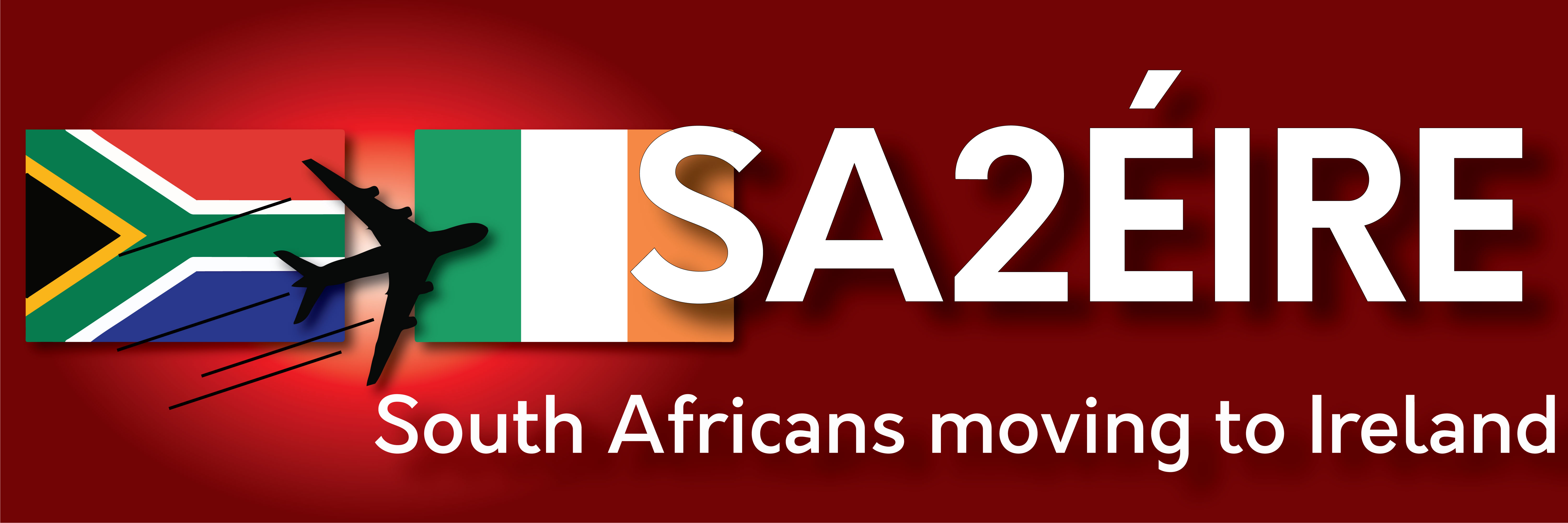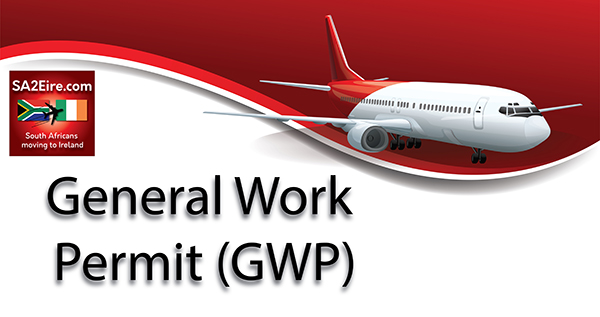
Going deeper into General Work Permits (GWP)
So, you have checked you are Eligible,
you have checked what the criteria are for a General work permit
...now, how do you get a job and get this process going?
SA passport holders cannot fly without a visa
VISA FREE ENTRY IS OVER AS OF WEDNESDAY 10TH JULY 2024
THERE IS A WINDOW FOR PEOPLE WITH BOOKINGS MADE PRIOR TO 10 JULY TO ENTER PRIOR TO 9TH AUGUST
NEW VISA- what we know so far- updates will be here
Confused or lost and need some direction,
book a session with us to help untangle the confusion
and work out your route of immigration
We offer a range of SUPPORTS to assist with your move.
We don't recommend you join our website until
you have checked your eligibility to make the move.
Once you are sure REGISTER HERE
Eligibility
We will assume now that you have done the SOC code checks Here and that you know you are neither Critical skills nor Ineligible, and as your career appears on neither list you are seeking a General Work Permit/ General Employment Permit (GWP or GEP)
GWP applicants are where their career is neither on the ineligible list of careers (or DETE has deemed a limited number of permits available for a short period of time, a quota of jobs advertised by DETE) or are on the Critical Skills List however do not meet the remuneration, qualifications or 2- year minimum job offer period.
These Minimum salary requirements were changed in Jan 2024

The Employer
The normal criteria for employers apply, which seek to ensure that the employer is a genuine and legal employer, so as to give a level of reassurance that the employment rights of employees will be adhered to.
DETE examines a number of criteria when assessing employers including:
- Applications will only be accepted from employers that are registered with the Revenue Commissioners
- Registered with the Companies Registration Office/Registry of Friendly Societies, if applicable, and which are currently trading in the State.
- That an employer – employee relationship will exist in that the prospective employee concerned will be employed, salaried and paid directly by the employer.
The Employer also needs to meet 2 testing criteria for General Work Permits:
1. Labour Market Needs Test and
2. 50:50 rule
In other words, the employer needs to be an Irish company, registered in Ireland, proof of their up to date tax returns
50% of their staff in their employment must be Irish, EU or British citizens in order for them to offer you a job
and they have to have done the advertising of that job in the exact manner required, before offering you the job.
What is needed for the application by the employer:
Employer Details
o Employer Registered Number (ERN) and Company Name Registered Number.
o Registered Name of Company/Business and Trading Name (if different).
o Type of Company (Sole Trader, Limited etc.).
o Nature of Business (Manufacturing, Software etc.).
o Number of EEA and/or Swiss Nationals (including Irish) currently in your employment
o Number of non-EEA Nationals currently in your employment.
o Confirm if any redundancies have taken place in the last 6 months for the same role.
o Name, position in company, telephone number and email address for contact person.
1) Labour Market Needs Test
As Ireland is part of the European Union, it has an obligation to fill careers from within Ireland and the European Union first. Careers deemed Ineligible therefore have been assessed by the Expert groups to have sufficient numbers of people skilled in these areas within Ireland and the EU already, and have no need to employ outside the EU for these careers.
Part of this agreement is then to advertise jobs to ensure that the Irish and EU job applicants have equal opportunity to apply.
“The Government’s policy is that employment opportunities which arise in Ireland should, in the first instance, be offered to suitably skilled Irish and other EEA nationals, and should only be offered to non-EEA nationals where no suitable candidate emerges from within the EEA to fill the vacancy. This policy also fulfils our obligations under the Community Preference principles of membership of the EU. In order to ensure that job opportunities are made available to Irish and EEA nationals, employers must satisfy a Labour Market Needs Test before a General Employment Permit or Contract for Services Employment Permit can be issued to a non-EEA national.” DBEI.gov.ie
The employer must advertise the vacancy:
- with the Department of Employment Affairs and Social Protection Employment Services/EURES employment network for at least 4 weeks and
- in a national newspaper for at least 3 days and
- in either a local newspaper or jobs website (separate to Department of Employment Affairs and Social Protection/EURES websites) for 3 days.
- the advert must include working hours and reunmeration of the position
In line with Regulations made under the Employment Permits Act 2006, as amended the vacancy must include the following information:
- a description of the employment,
- the name of the employer,
- the minimum annual remuneration,
- the location/s of employment, and
- the hours of work.
Exceptions to having the Labour Market Needs test done can be found HERE:
An application for an employment permit can only be submitted when the Labour Market Needs Test has been completed and the application must be submitted within 90 days of the commencement of the advertisement on JobsIreland/EURES.
Employers should note that vacancies should not be amended or extended, at any time, during the 28 days of advertising on the JobsIreland site.
Proof of this advertising having been done, IN THE EXACT MANNER REQUIRED, prior to the application date, will be required for the work permit application.
Without that proof the application will be declined.
2) 50:50 Rule
An employment permit will not issue unless at the time of application at least 50% of the employees of the company are EEA nationals.
- An employment permit will not issue unless at the time of application at least 50% of the employees in a firm are EEA nationals (50:50 rule).
- The 50:50 rule is waived in certain circumstances see the website HERE
In other words, the employer needs to prove 50% of their staff in their employment must be Irish, EU or British citizens in order for them to offer you a job.
The company has to submit, in the work permit application,
The Employee:
o Name, date of birth, gender, nationality, current address, telephone number, email
address and PPS number (if you already have one).
o Passport number and expiry date (Passport must be valid for at least 6 months for a
new employment permit and 3 months for a renewal employment permit).
o If you are resident in the State, you must confirm on what basis and provide your
GNIB/Irish Resident’s Permit Pin. This 6-digit registration number is located on the back
of the Residence Permit Card.
o Confirm details of qualifications relevant to hospitality management role.
o Details of previous visa permissions or employments in the State
Details of the job offer/ application:
You need to be able to prove, if needed, you are:
1. Qualified and/or experienced for this role (career dependant)
2. The salary requirements - per hour, per week and annual meet the required sum
3. Location of the position- this is to protect the employee. (lets say you were set to work in Enniscorthy and you have a home and life set up and then the employer says nahhhhh we going to send you to Donegal... your rights are then protected under the contract
4. what exactly the job title and description are- do they meet the SOC code requirements to be an eligible career?
Recognition of qualifications and Registration with Irish bodies or organisations:
Some careers require registration or recognition
Most registrations with bodies or organisations usually take the form of 2 stages: Recognition of your qualifications and then the Registration process.
Depending on the nature of the career or the type of registration you may need to get hold of transcripts of your degree and results, you may need to contact your Tertiary Education Insitution where you studied.
Give yourself plenty time to get this done.
We don't recommend you go seeking work until this is done, job offers have been retracted and work permits declined because the applicant cannot get registration done in time.
It's therefore advised if you are in the investigation stage of moving to Ireland that you start gathering documents you need and do the reading on registration for that particular Body and how it works long before you proceed.
Time frames could be 6-12 months for some, it may be weeks for others. This will be an important factor when it comes to your time-lines on applying for work and doing things like selling your home in SA.
If this isn't a requirement, you may want to look at joining organisations or bodies regardless to assist in finding work in that field.
This could add clout to your job applications. You may not HAVE to... but will it benefit you? Do they have a job portal on their website for members for example? Will you have access to networking with potential employers in that field? What about skills training or industry updates that may not be in SA yet?
"Professional bodies are organisations which act on behalf of the interests of those working within a particular industry or speciality and the public interest.
The aim of these organisations is to maintain control and standards of the profession.
These bodies often run certification programmes to further improve and update the skills of practitioners.
Becoming a member of a professional body can have many benefits, such as:
- Networking can become easier and more applicable through industry relevant events held by the organisation and attended by your peers.
- Upskilling can become more affordable through workshops and courses available to members at a reduced cost.
- Access to resources and guidance.
- Access to industry insights that may otherwise be tricky to source.
- New employers will recognise membership as a commitment to your career and to the highest standards of your profession."
Wallace Myers- Bodies and Organisation registrations HERE
Also you may want to check with Competent Authorities here: competent authorities (pdf) If you do not find your profession on this list of competent authorities, you can email This email address is being protected from spambots. You need JavaScript enabled to view it..
See link below for details on Registering with Organisations and bodies BEFORE looking for work
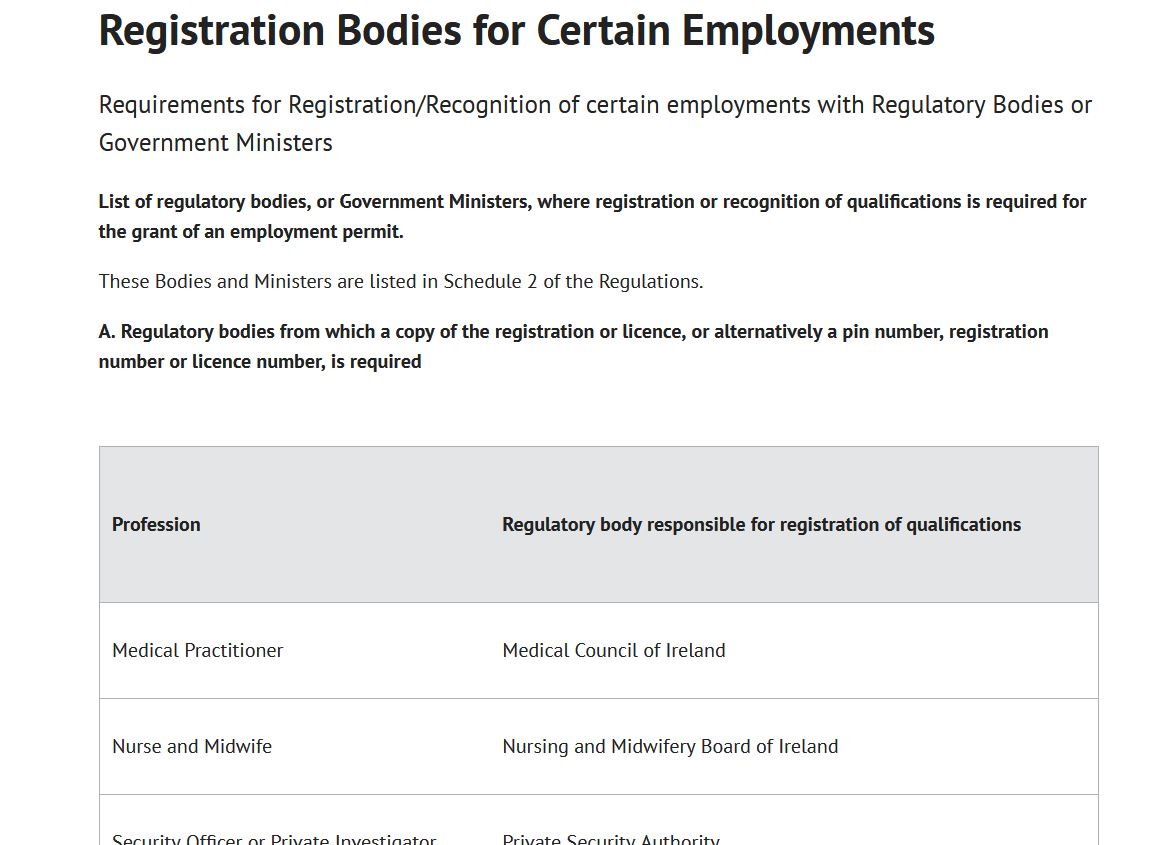
Check your qualifications
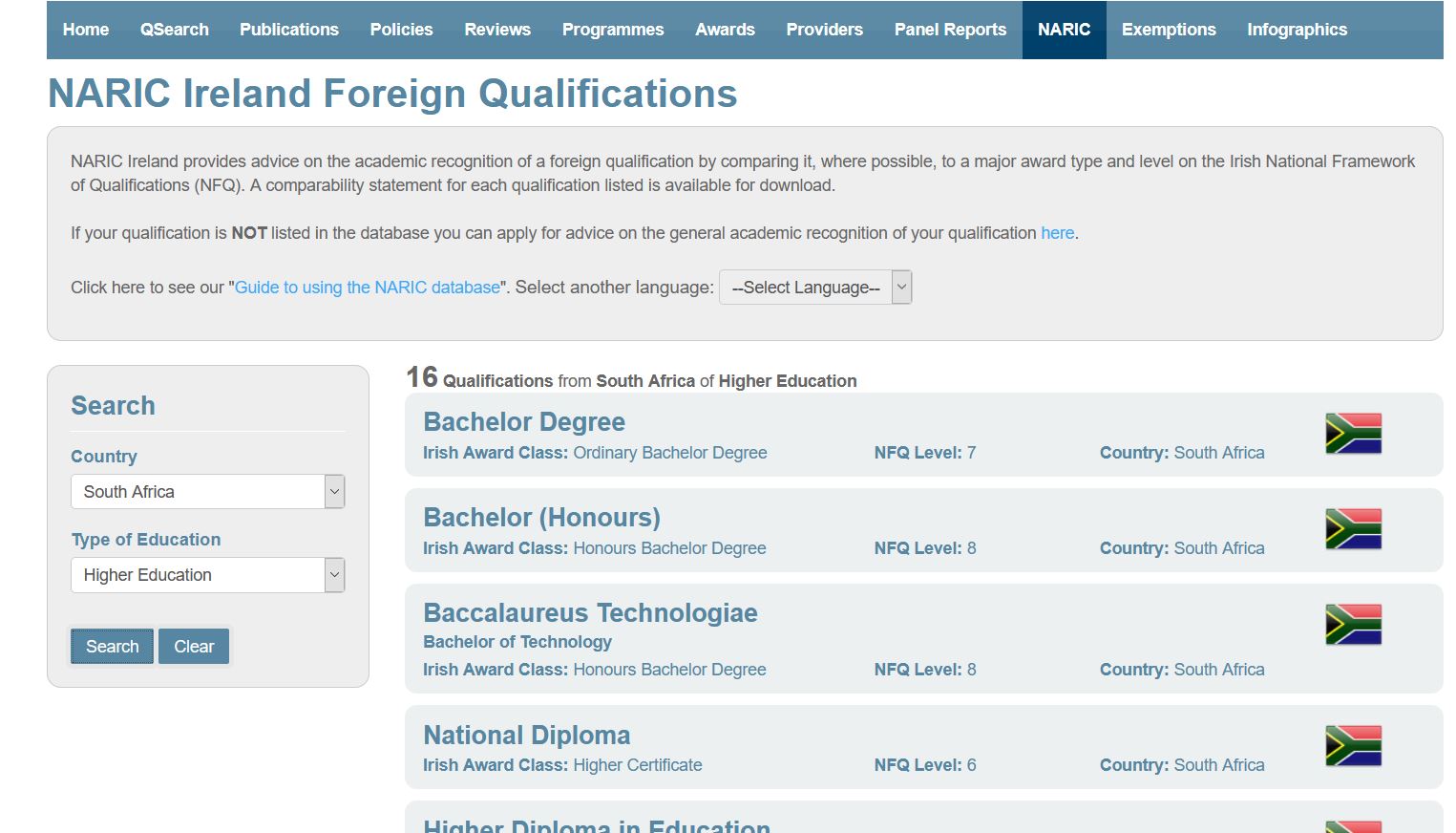
Ireland has a different education system and terminology of what degrees are or what they are in equivalent terms may be an important part of the job application process.
Make sure to include in your CV the full name of your degree but also what that is in Irish terminology, so include the NQF level.
Careers may have different names or terminology, so do some job searches on the relevant employment sites and see whether job terminology is the same.
Also, refer back to the SOC code ONS tool to see what qualifications are required for
The National Framework of Qualifications (NFQ) is a system of 10 levels which allows you to compare different types and levels of qualifications available in Ireland. Qualifications on the framework include:
- Junior Certificate (NFQ Level 3)
- Leaving Certificate (NFQ Levels 4 and 5)
- Advanced Certificate – Craft / Higher Certificate(NFQ Level 6)
- Ordinary Bachelor Degree (NFQ Level 7)
- Honours Bachelor Degree / Higher Diploma (NFQ Level 8)
- Masters Degree (NFQ Level 9)
- Doctoral Degree (NFQ Level 10)
Click on South Africa, your Education level, and on the new window you will see the details of your degree/ qualifications. Click on the one that applies to you.
Download a Comparability Statement which can be attached to your CV or covernote to go with your job applications.
If your degree is not on there you can request Request for Advice on Recognition of a Foreign Qualification HERE
Your CV and Tips on applying for jobs
Your best investment either in your own time or if you pay someone to do it for you, is your CV.
The SA format is usually long and tedious and will be ignored by most Irish employers.
They want to see a short, consise, results driven CV. Using certain catchphrases or terms will also improve your chances because of the computerised systems that review your CV in many cases before a human being even sees it! You want to invest into this so that your CV is seen by a human being, and that your CV stands out against all the others. You may want to invest in a Professional CV writer- make sure this person has experience specific to the Irish market, or you may want to research and do it yourself.
Like anything, you can do things yourself step-by-step or you can invest in someone to walk you through the process. That choice is yours.
We have a full article on CV Writing and lists of recruiters, be sure to read this, as recruiters are NOT the only way to find work.
 Getting Employed: CV writing and Recruiters - written in 2 parts: 1 focussing on CV writing, registration and recognition of qualifications and another on specifically how to find employment, employers and recruiters
Getting Employed: CV writing and Recruiters - written in 2 parts: 1 focussing on CV writing, registration and recognition of qualifications and another on specifically how to find employment, employers and recruiters
This article above covers all of the following:
- Compiling your Curriculum Vitae
- Curriculum Vitae Templates
- Generating effective CV's
- CV do's and do nots- what to include and exclude from a CV
- Recruitment Agents and Websites
- LINKEDIN (and social media presence)
- Things employers are looking for
I have a job offer what now?
The entire application process cannot be done whilst in Ireland, you must do all applications from South Africa.
Applying whilst in the Republic of Ireland will result in a refusal of your work permit as will coming to Ireland whilst your work permit is in progress of being processed.
You can only come to Ireland when you have that work permit in your possession, it is needed as proof to enter the country.*
*Only exceptions would be where you already have a residency permit (IRP) from an existing status and you are applying for a new work permit.
*For example: EU treaty to work permit, or study to work permit, or spouse of a work permit holder with an IRP in hand applying for a work permit of their own.
*You can enter for an Interview prior to work permit application, and then return to SA to do the rest of the offer/ application process.
Visiting Ireland HERE
Application for a work permit HERE
It is normal for a company to do this application themselves, the nature of the documentation needed for the 50:50 and needs test most companies won't want to hand over to a new member of staff.
If however you find you are going to do the application yourself, book a session with us and we can help you through it
#MapMyMove- Our coaching Services
Work Permit Seekers and looking for work whilst on Holiday/Visiting in Ireland
No, you cannot seek work whilst in Ireland and you cannot come to Ireland until that work permit is approved.
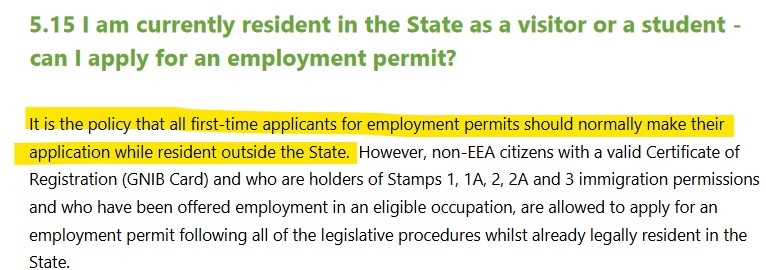
Trusted partners
A company wishing to employ Non-EU staff regularly can apply to become a Trusted partner. When Trusted Partner status is granted a unique Trusted Partner Registration Number is assigned. Applicants granted Trusted Partner status will have access to their own suite of employment permit application forms where they must only provide their Trusted Partner Registration number in lieu of all employer details. Once done, this shaves off time on the application process, because once registered, DBEI does not need to investigate the company and the employee on the work permit, because half the work is done already. It also means the company knows the requirements of critical skills and general work permits, how things like the 50:50 rule and how jobs need to be posted on EURES for the labour market needs etc etc for General work permits. The application is free, and is valid for 2 years.
The benefits of the Trusted Partner Initiative are:-
- Fast turnaround of Trusted Partner registration applications
- Status valid for 2 years
- No fee
- Reduced paperwork for every permit applied for under the scheme
- Shortened employment permit application forms
- Faster turnaround of Trusted Partner employment permit applications.
- An application to register as a Trusted Partner can be made online on the Employment Permits Online System.
There is no lists of Trusted partners, but you can look at previous years work permit approvals and see which companies have had sucessful permits applied to it's non-EU staff (see link below)
Trusted Partner applications (New/Renewal) - This email address is being protected from spambots. You need JavaScript enabled to view it.
See link below for details from the DETE on a company becoming a trusted partner.
Fees and Processing of your work permit
The fee for a General Work Permit must be paid by the applicant. The applicant can be the employer, the employee, a connected person or contractor, or an authorised agent.
Payments from businesses are made by electronic fund transfer (EFT).
Currently this fee is EUR1000.
If an application is refused or withdrawn, 90% of the fee will be refunded to the applicant.
The fee for the Certificate of Registration is €300. This is done once you are in Ireland at a Garda Immigration (Burgh Quay if in Dublin or in the town or district where you live outside of Dublin).
- Register at Garda Immigration - How to register at Garda Immigration and Renewals of Residency stamps
You need to do this to get permission to remain and to ensure you have the correct immigration status, as an employee.
You will be given a Certificate of Registration which is also known as an Irish Residence Permit (IRP) (formerly called a GNIB card).
GWP spouse and dependants arriving after 12 months
You can have your spouse, partner and minor dependant children (under 18 years) to live with you in Ireland after you, the GWP holder has been legally working in Ireland for a year on a General Employment Permit.
You may join your family member after they have been legally working in Ireland for a year (renewal of Work permit or IRP)
"Category B employment permit holder - you must wait 12 months after your family member registers with immigration."
You also must be able to show that you will be able to support them. In practice, you need to be earning more than the limits for Working Family Payment. Working Family Payment is a benefit offered to Irish and EEA residents who may earn below minimum living wage and as such are eligible for a benefit top-up to their wages. This WFP is used as a measure as to the minimum wage a GWP holder must earn based on the number of children you have.
See the Family Reunification document information:
Family Reunification Document - Family members of Irish and Work permit holders, we have gone through this 71 page document page by page with a breakdown and information.
Also, the spouse and children of General Work permit holders how they apply for this when they arrive:
- General Work permits how to get your family processed when they arrive after 12 months
- Spouses and Children of Work permits and their Stamps explained
This will include how to get their residency application in and what paperwork is required and what salaries you need to earn based on the number of children you have.
SPOUSES OF GWP CAN NOW WORK- UPDATE 15/5/24
-
For a General work permit holder to bring their children after 12 months of residency and their permissions renewed, they need to prove earnings, before taxes, basic salary, no shift allowances, overtime or bonuses, of these (attached) weekly and yearly salaries to qualify, depending on the number of children you are bringing.
The current rates have been increased by €54 a week from January 2024.
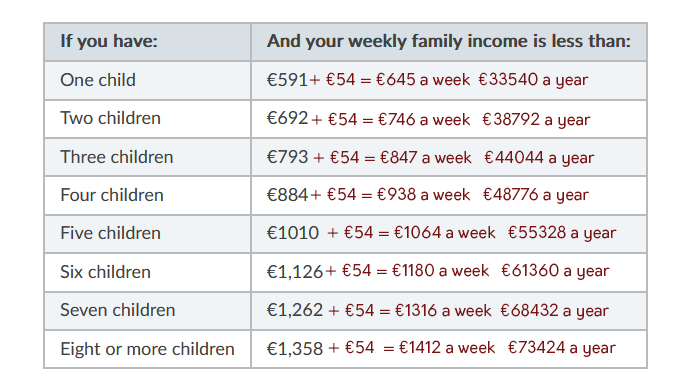
We often get asked, if both parents get their own GWP’s can children join?
The answer simply going by the Family Reunification document, is no.
Category B (Eligible to sponsor applications for family reunification after 12 months)
- Non Critical Skills Employment Permit Holders
- All Stamp 4 holders not covered by other more favourable arrangements
- Ministers of Religion (there is a case for putting these in cat A provided they are maintained by the church)
A General work permit holder cannot sponsor anyone until they have been registered as Category B sponsors for 12 months and meet the financial criteria based on the number of children there are, are met.
We have spoken to some Solicitors. Exceptions have occurred via an Irish Solicitor where it has been proven that there are no remaining family members in South Africa who can care for the children, but this requires a Solicitor and proof in abundance that no carer in SA exists or those that are, are incapable of such care. You can contact some of the Irish Solicitor's to process this for you should both parents be in possession of their GWP, they cannot process it before hand on the off-chance you MIGHT both get GWP’s.
General Work permits how to get your family processed when they arrive after 12 months
We often get asked, can my family come and visit and how often during that 12 months?
We simply cannot give a definitive answer. This is completely in the hands of BMU.
What we do know is that 180 days of holiday in a year will not be allowed as that is residency numbers, it is more likely you will get a 30 day holiday once maybe twice in that year than 2 x 90days
We do know that it is UP TO 90 days, not necessarily the full 90 days you will be approved for. A 90 days visit is fully at the discretion of the BMU Officer and they can give you just 2 weeks if they feel that is sufficient
Boarding by the airline and Entry in to Ireland is based on holidays, on proof of return, this is more extensive paperwork than just a return ticket, make sure you read the articles on Visiting Ireland and proof of work in SA and/or schools for the kids to return to
Visiting Ireland - As South African, what documents do I need to enter Ireland on holiday, business trip, conference or job interview?
Letter of Invitation - For family joining you later in Ireland/ Coming on Holiday/ Job Interview
Entry Visas
If you, your spouse and children are all South African Passport holders, you do not need an entry visa into Ireland.
This is because Ireland and South Africa have a special agreement that allows South Africans to enter Ireland visa free.
This entry however is subject to having sufficient paperwork at entry, this is discussed later in the Resources section “Entry into Ireland.”
At entry into Ireland you will get an entry stamp of up to 90 days for all South African members of your family. This entry stamp will be placed in the South African members passports.
An employment permit is not a Residence Permission.
In order to be lawfully resident in the State, it is a requirement that all non-EEA nationals in possession of an employment permit must register with the Garda National Immigration Bureau. The cost of this residency stamp for each applicant is EUR300 per dependant over the age of 16years
See link below on how the family registers at Garda Immigration when they arrive and Renewals of Residency stamps.
Work permit holders and travel to the EU and UK
Once a South African passport holder is in possession of the IRP card, they can apply for visas for the UK (Standard UK visitor visa) or the EU/EEA to the country they want to visit.
Holding an IRP for Ireland does not automatically give rights to travel to the EU/EEA or UK. The IRP is permission live and work in Ireland alone.
If the country is in the Schengen zone that you wish to visit, you apply for a Schengen visa for that country.
If any other country, apply direct for that country
SA2Eire are going to go through this process step-by-step with you:
-
Types of work permits and articles:
- Work Permit skills lists: Am I eligible and SOC codes
- Critical skills work permits how they work: The Basics of applying
- Critical skills going deeper into the information and getting a job offer and work permit
- General Work permits how they work: The Basics of applying
- General Work permits going deeper into the information and getting a job offer and work permit (this article)
- General Work permits how to get your family processed when they arrive after 12 months
- Spouses and Children of Work permits and their Stamps explained
Important links:
 #MapMyMove- Our coaching Services - Confused or lost and need some direction, book a session with us to help untangle the confusion and work out your route of immigration
#MapMyMove- Our coaching Services - Confused or lost and need some direction, book a session with us to help untangle the confusion and work out your route of immigration
 Bodies/Organisations you would need to register with for certain careers
Bodies/Organisations you would need to register with for certain careers
 Previous year's approved work permits
Previous year's approved work permits
